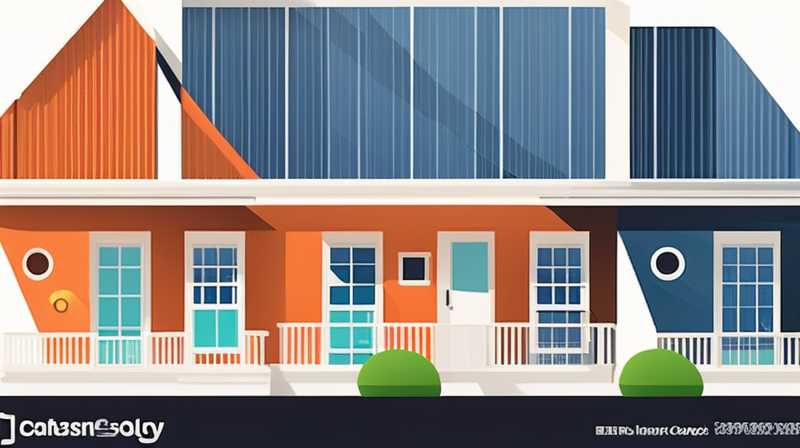
1. MATCHING A HOME SOLAR SYSTEM REQUIRES CAREFUL CONSIDERATION OF SEVERAL FACTORS, INCLUDING ENERGY NEEDS, LOCAL CLIMATE CONDITIONS, AND BUDGET.
2. UNDERSTANDING ENERGY USAGE
To successfully align a solar system with a home’s energy demands, one must first gain a comprehensive grasp of energy consumption patterns. Homeowners should conduct an energy audit, assessing their monthly and yearly electricity usage which typically involves reviewing electric bills to decipher peak consumption times and seasonal variations. Additionally, there are various tools available to help monitor real-time usage, providing deeper insight into energy requirements.
Analyzing this data allows for informed decisions regarding the solar system’s size and capacity. By understanding high-consumption appliances, such as air conditioners or electric heating, homeowners can better gauge what output is needed from a solar installation. In regions with varying energy demands across seasons, it is prudent to anticipate fluctuations, ensuring the solar system can accommodate peak usage times to maximize efficiency and effectiveness.
3. LOCAL CLIMATE InFLUENCES
Another pivotal aspect that significantly affects how well a home solar system integrates revolves around local climate conditions. Solar efficiency is deeply intertwined with geographical and atmospheric factors including sunlight intensity, duration, and weather patterns. Areas that consistently receive ample sunshine present a prime opportunity for solar energy efficacy, while regions with frequent cloud cover or precipitation can present challenges for solar systems.
Moreover, harsh weather conditions like snow, hail, or extreme temperatures can impact a system’s performance and longevity. Choosing the right type of solar panels, considering durability, efficiency ratings, and warranties can mitigate some of these climatic challenges. Even in less sunny locales, technological advancements in solar energy conversion are making renewable solutions increasingly viable.
4. BUDGET CONSIDERATIONS
When integrating a solar system into a home environment, budgetary constraints play a critical role in determining the type and size of installation. Outlining the financial aspect includes evaluating initial costs, long-term savings, available incentives, and financing options. High upfront costs can deter homeowners from adopting solar technology, yet it is essential to analyze the returns in terms of reduced energy bills and potential increase in property value.
Additionally, various government incentives and tax credits can significantly lower the financial burden. Homeowner associations, local utilities, and state programs may all present different incentives that can lessen costs. Each homeowner should thoroughly research these options while balancing them against the projected savings on energy bills over time.
5. TECHNICAL ASPECTS OF SOLAR SYSTEM
Integrating a home solar system involves numerous technical elements that must be aligned for optimal performance. Understanding the components of the solar power system—known as photovoltaic (PV) systems—helps clarify the integration process. These systems comprise solar panels, inverters, mounting racks, and battery storage options. Each part must be selected based on compatibility with one another and the specific needs of the household.
In addition to selecting equipment, professional installation plays a significant role in maximizing system efficacy. Installation methodologies that consider roof orientation, tilt angles, shading issues, and overall system design must be executed meticulously. Collaborating with experienced professionals not only ensures proper setup but also aids in ongoing maintenance and troubleshooting.
6. MAINTENANCE AND SUSTAINABILITY
Emphasizing maintenance as part of the solar installation process ensures longevity and sustainability of the system. Regular assessments and upkeep are crucial for preserving a system’s performance and efficiency. Simple practices like cleaning solar panels to remove dirt, debris, and snow can substantially enhance energy absorption.
Moreover, scheduling routine professional inspections can also identify potential issues before they develop into costly repairs. Implementing a maintenance plan contributes to maintaining operational efficiency and prolonging system lifespan, thereby yielding greater long-term benefits for homeowners.
FREQUENTLY ASKED QUESTIONS
WHAT TYPE OF SOLAR PANELS ARE BEST FOR HOME USE?
When determining the most suitable solar panels for residential use, various factors come into play, including efficiency, durability, and cost. Monocrystalline panels are often considered the best; they boast high efficiency rates and require less space due to their design. However, they tend to be pricier than other options like polycrystalline panels, which are slightly less efficient but more affordable.
Thin-film solar panels represent another alternative, providing flexibility and lighter weight. However, they usually offer lower efficiency, meaning a larger installation area may be needed. Homeowners must prioritize their specific circumstances—like available roof space, budget allocation, and aesthetic preferences—when making a decision. Consulting with a solar energy provider can provide personalized insights and recommendations based on unique needs.
HOW DOES SOLAR ENERGY AFFECT PROPERTY VALUE?
The introduction of solar energy into a residential property commonly enhances its market value. Many studies indicate that homes equipped with solar panels tend to sell at higher prices and faster than those without. This value increase is attributed to potential savings on energy bills and growing public interest in energy-efficient technologies.
Local market conditions and incentives offered in a particular area significantly influence the impact of solar installations on property value. Homebuyers today are increasingly interested in sustainable living options, indicating that having a solar system may translate to a competitive advantage in the real estate market.
IS SOLAR ENERGY WORTH THE INVESTMENT?
Investing in solar energy can certainly be worthwhile, especially when approached strategically. Individuals should analyze their localized energy costs, available incentives, and typical system financing. Over time, solar system installations often become cost-effective solutions, yielding significant savings on energy bills. Additionally, with energy prices generally climbing, reliance on self-generated energy can protect against rate increases.
Factors like the cost of installation, federal and state tax incentives, and local energy rates determine how quickly the investment pays off. Homeowners are encouraged to conduct comprehensive assessments, including return on investment calculations, to clarify the long-term financial implications associated with adopting solar technology.
THE FINAL ANALYSIS OF HOME SOLAR SYSTEM MATCHING ENCOMPASSES MULTIFACETED CONSIDERATIONS THAT CAN SIGNIFICANTLY ENHANCE A HOUSEHOLD’S SUSTAINABILITY, COST-EFFECTIVENESS, AND LONG-TERM ENERGY INDEPENDENCE.
Original article by NenPower, If reposted, please credit the source: https://nenpower.com/blog/how-to-match-a-home-solar-system/


